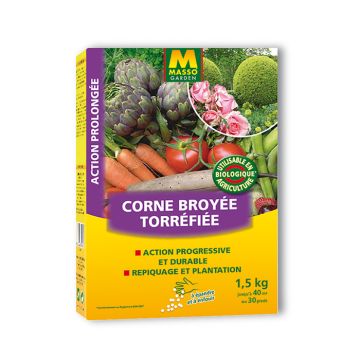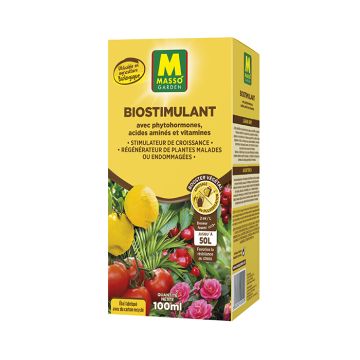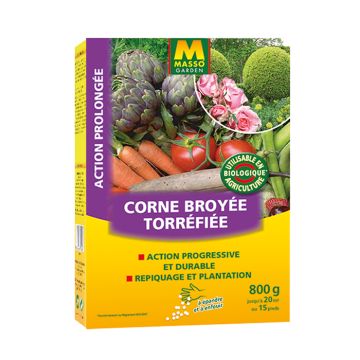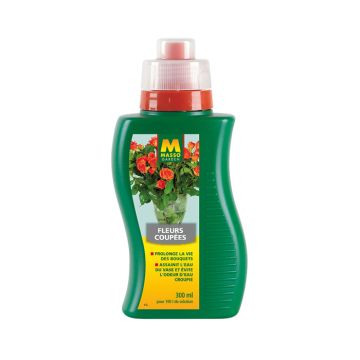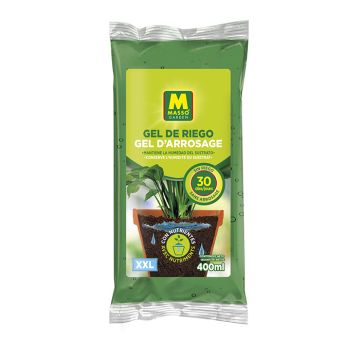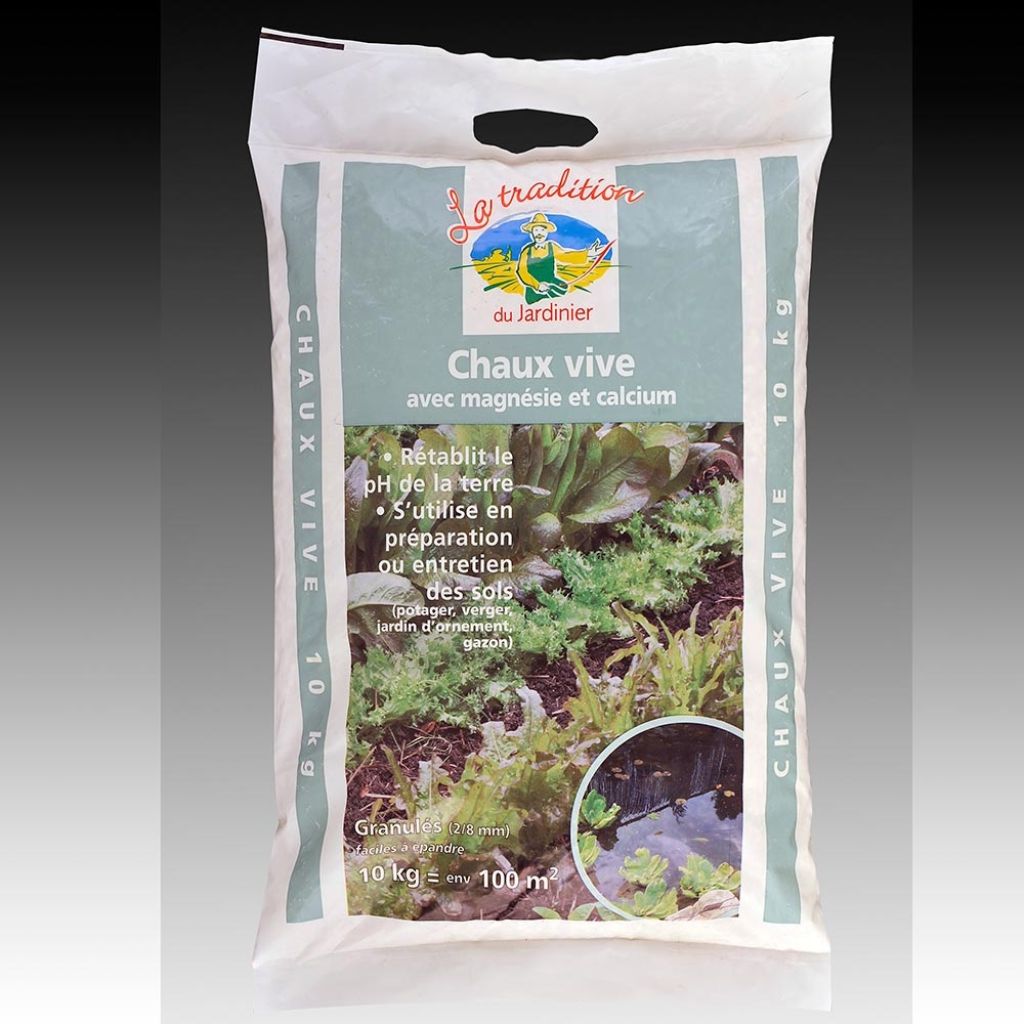

Quicklime pH: 92
Quicklime pH: 92
Special offer!
Receive a €20 voucher for any order over €90 (excluding delivery costs, credit notes, and plastic-free options)!
1- Add your favorite plants to your cart.
2- Once you have reached €90, confirm your order (you can even choose the delivery date!).
3- As soon as your order is shipped, you will receive an email containing your voucher code, valid for 3 months (90 days).
Your voucher is unique and can only be used once, for any order with a minimum value of €20, excluding delivery costs.
Can be combined with other current offers, non-divisible and non-refundable.
Home or relay delivery (depending on size and destination)
Schedule delivery date,
and select date in basket
We guarantee the quality of our plants for a full growing cycle, and will replace at our expense any plant that fails to recover under normal climatic and planting conditions.

Lime is a basic amendment rich in calcium oxide (CaO) intended to correct the pH of excessively acidic soils and improve the structure of excessively clayey soils, which are not conducive to crops. It also has many uses in the garden. Once criticised, this ecological and natural mineral-based product is suitable for organic agriculture. Easy to spread, it comes in the form of granules that diffuse into the soil through watering and rain.
Acidification is a natural biological process in non-chalky soils under our climates. The neutralisation of this acidity, which can be objectively observed through soil analysis or pH measurement, can be achieved through a basic amendment such as lime. Both preventive and curative, its use aims to bring and maintain the soil pH close to 7. This is an optimal value for soil biological activity and for the assimilation of nutrients by many vegetable, ornamental, and fruit crops. This lime comes in granules with a diameter of 2 to 8 mm. It comprises at least 90% calcium oxide (CaO) and 3% magnesium oxide (MgO). Rich in magnesia, it also improves the flavour of fruits. This amendment also helps to stop the proliferation of moss in lawns and inhibits the growth of fungi thanks to its antifungal properties. It can also be used in the form of lime milk (diluted lime in water) to be applied every two years during winter on the lower part of fruit tree trunks to repel parasites, eliminate larvae and fungi, and protect fruit trees against cryptogamic diseases (scab, rust, powdery mildew, leaf curl, etc.). Lime can be perfectly combined with traditional NPK fertilisers. This amendment is not suitable for ericaceous plants and soils such as rhododendrons, camellias, pieris, kalmias, and heathers.
Lime is used for liming vegetable gardens, ornamental gardens, orchards, treating ponds and cesspits, or burying small dead animals. Liming every 2 to 3 years is generally sufficient to correct soil acidity. It can be done in spring after spreading manure in autumn or when planting if the soil has not received compost or manure.
Dosage: 10 to 15 kg per 100 m².
Caution: Lime is a dangerous product. It is irritating to the skin and respiratory tract and should never be touched by the eyes. Handling it with gloves, protective clothing, and goggles is imperative. In case of contact with the substance, rinse the affected area thoroughly for several minutes and promptly contact a doctor or emergency services.
Do not overuse- Use only when necessary.
Fertiliser NF U 44-001 - Product suitable for use in organic agriculture by EC regulations 834/2007 and 889/2008
Technical features

Detailed features
Tips
Tips
This item has not been reviewed yet - be the first to leave a review about it.
Similar products
Haven't found what you were looking for?
Hardiness is the lowest winter temperature a plant can endure without suffering serious damage or even dying. However, hardiness is affected by location (a sheltered area, such as a patio), protection (winter cover) and soil type (hardiness is improved by well-drained soil).

Photo Sharing Terms & Conditions
In order to encourage gardeners to interact and share their experiences, Promesse de fleurs offers various media enabling content to be uploaded onto its Site - in particular via the ‘Photo sharing’ module.
The User agrees to refrain from:
- Posting any content that is illegal, prejudicial, insulting, racist, inciteful to hatred, revisionist, contrary to public decency, that infringes on privacy or on the privacy rights of third parties, in particular the publicity rights of persons and goods, intellectual property rights, or the right to privacy.
- Submitting content on behalf of a third party;
- Impersonate the identity of a third party and/or publish any personal information about a third party;
In general, the User undertakes to refrain from any unethical behaviour.
All Content (in particular text, comments, files, images, photos, videos, creative works, etc.), which may be subject to property or intellectual property rights, image or other private rights, shall remain the property of the User, subject to the limited rights granted by the terms of the licence granted by Promesse de fleurs as stated below. Users are at liberty to publish or not to publish such Content on the Site, notably via the ‘Photo Sharing’ facility, and accept that this Content shall be made public and freely accessible, notably on the Internet.
Users further acknowledge, undertake to have ,and guarantee that they hold all necessary rights and permissions to publish such material on the Site, in particular with regard to the legislation in force pertaining to any privacy, property, intellectual property, image, or contractual rights, or rights of any other nature. By publishing such Content on the Site, Users acknowledge accepting full liability as publishers of the Content within the meaning of the law, and grant Promesse de fleurs, free of charge, an inclusive, worldwide licence for the said Content for the entire duration of its publication, including all reproduction, representation, up/downloading, displaying, performing, transmission, and storage rights.
Users also grant permission for their name to be linked to the Content and accept that this link may not always be made available.
By engaging in posting material, Users consent to their Content becoming automatically accessible on the Internet, in particular on other sites and/or blogs and/or web pages of the Promesse de fleurs site, including in particular social pages and the Promesse de fleurs catalogue.
Users may secure the removal of entrusted content free of charge by issuing a simple request via our contact form.
The flowering period indicated on our website applies to countries and regions located in USDA zone 8 (France, the United Kingdom, Ireland, the Netherlands, etc.)
It will vary according to where you live:
- In zones 9 to 10 (Italy, Spain, Greece, etc.), flowering will occur about 2 to 4 weeks earlier.
- In zones 6 to 7 (Germany, Poland, Slovenia, and lower mountainous regions), flowering will be delayed by 2 to 3 weeks.
- In zone 5 (Central Europe, Scandinavia), blooming will be delayed by 3 to 5 weeks.
In temperate climates, pruning of spring-flowering shrubs (forsythia, spireas, etc.) should be done just after flowering.
Pruning of summer-flowering shrubs (Indian Lilac, Perovskia, etc.) can be done in winter or spring.
In cold regions as well as with frost-sensitive plants, avoid pruning too early when severe frosts may still occur.
The planting period indicated on our website applies to countries and regions located in USDA zone 8 (France, United Kingdom, Ireland, Netherlands).
It will vary according to where you live:
- In Mediterranean zones (Marseille, Madrid, Milan, etc.), autumn and winter are the best planting periods.
- In continental zones (Strasbourg, Munich, Vienna, etc.), delay planting by 2 to 3 weeks in spring and bring it forward by 2 to 4 weeks in autumn.
- In mountainous regions (the Alps, Pyrenees, Carpathians, etc.), it is best to plant in late spring (May-June) or late summer (August-September).
The harvesting period indicated on our website applies to countries and regions in USDA zone 8 (France, England, Ireland, the Netherlands).
In colder areas (Scandinavia, Poland, Austria...) fruit and vegetable harvests are likely to be delayed by 3-4 weeks.
In warmer areas (Italy, Spain, Greece, etc.), harvesting will probably take place earlier, depending on weather conditions.
The sowing periods indicated on our website apply to countries and regions within USDA Zone 8 (France, UK, Ireland, Netherlands).
In colder areas (Scandinavia, Poland, Austria...), delay any outdoor sowing by 3-4 weeks, or sow under glass.
In warmer climes (Italy, Spain, Greece, etc.), bring outdoor sowing forward by a few weeks.






























